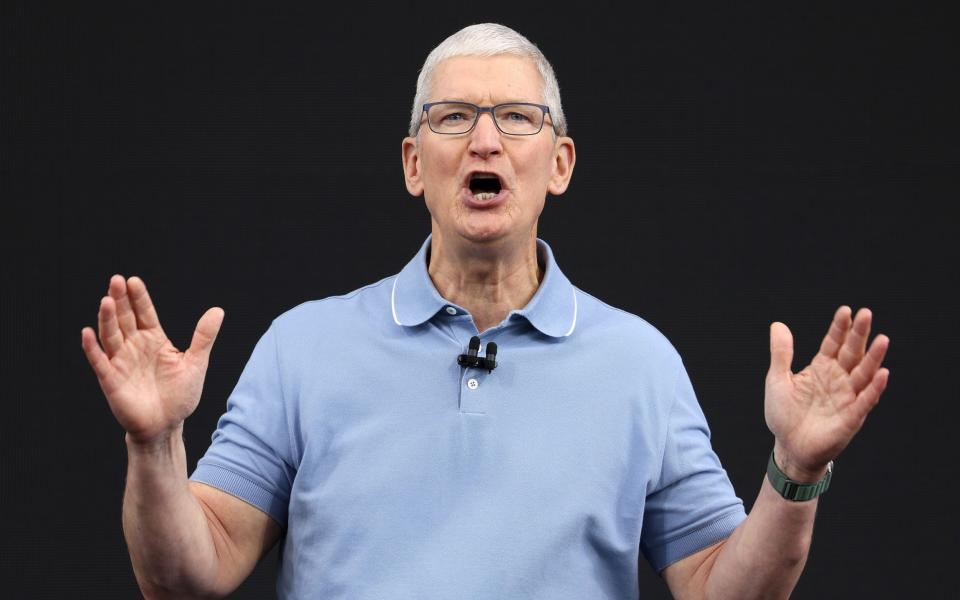Apple may be about to repeat Mark Zuckerberg’s ruinous mistake

There were many leaks in advance. There was plenty of razzmatazz. Tim Cook paced around the stage doing a decent impression of the late Steve Jobs, and the online fans were out in force on social media praising it as though it was the greatest thing since, well, whatever the last greatest thing was.
As Apple announced its move into augmented reality with its Vision Pro headset, it came with all the hype that surrounds one of the most formidable companies in the world. But there is one small problem: the product.
Meta has already lost billions of dollars trying to persuade us all to live in an imaginary world. Microsoft and Google have had similar misfortune, if not quite on the same scale. The harsh reality (rather than the virtual one), is that Silicon Valley has increasingly run out of fresh ideas, and has started chasing rather stale ones.
It was perhaps only a matter of time before Apple tried to muscle its way into this market. Reports and rumours have circulated for years that it was working on a product. And tonight it finally launched a headset that will transport people into a different world, allowing them to work remotely, connect with apps, and try out different experiences, without ever leaving their own home.
If it gets this right, according to the more bullish estimates, it could create a vast new market for the company, and finally wind down its critical dependence on the iPhone.
With $74 billion of sales in China at risk due to escalating tensions with the US, this is a significant opportunity. Apple’s smartphone has been fantastically popular, but the company needs a new offer for customers to ensure sales keep moving forward.

Less clear is why Apple has chosen augmented reality. It is hard to think of any market over which so many large, successful companies have battled furiously for so little in the way of returns. It is at risk of becoming the graveyard of the corporate world.
Meta, the owner of Facebook and WhatsApp, not only expensively rebranded itself for its move into the “metaverse”, but spent vast sums of money trying to persuade us all to spend even more of our lives online.
Since 2019, Mark Zuckerberg’s company, which pioneered social media brilliantly, has spent an estimated $36 billion on its Reality Labs, yet last year alone the unit lost $13.7 billion. It claims to have sold nearly 20 million of the Quest headset which, if accurate, is still a tiny proportion of the hundreds of millions of global users of Facebook, Instagram and WhatsApp.
Spending on VR crashed the share price, as investors lost faith in any meaningful returns, and only started to recover once it started to pull back from the sector, and refocused on the messages and posts that made it so successful in the first place.
It is not just Meta. In fact, there is a long history of failed augmented and virtual reality products that completely failed to live up to the hype around them. Does anyone remember Google Glass? Despite spending what in retrospect seems a fairly modest amount – estimates are around $500 million – its web-connected glasses no longer exist.
Microsoft launched the HoloLens back in 2016 and took an early lead in the race to the metaverse. But last year the Wall Street Journal reported it had shelved a planned new version and has struggled to meet technical requirements for its biggest buyer, the US Army. Microsoft has recently restructured the group that developed the headsets, and trimmed its budget.
In 2019, Amazon launched VR streaming through its Prime service, but there were few adopters. Most of us are content watching our conventional TV– for now.
Undeterred by its earlier failures, Google is reported to be re-entering the fray, with “Project Iris” allegedly set to be delivering an augmented reality headset by next year.
The list goes on and on. Even Uber tried to get in on the act, announcing in 2021 that it was exploring how to put VR into self-driving cars.
![Google Glasses of the Future...In this undated handout photo provided by the Google[x] group's "Project Glass", an early prototype of Google's futuristic Internet-connected glasses, are modeled. The specs are said to give you directions, let you video chat, shop and do everything else you now need a handheld gadget to accomplish. Google gave a glimpse of \u0093Project Glass\u0094 in a video and blog post this week. (AP Photo/Google) - AP Photo/Google](https://s.yimg.com/ny/api/res/1.2/SZyGZ3nHNqrJWOICukuYIQ--/YXBwaWQ9aGlnaGxhbmRlcjt3PTk2MDtoPTYwMQ--/https://media.zenfs.com/en/the_telegraph_258/a8c728b4c08279474268adf5b9f84066)
It suggested VR could be used to increase empathy, reduce bias and encourage more inclusive behaviours, and launched a pilot VR learning experience to “put employees directly in the shoes of someone else’s experience”.
There are undoubtedly some niches that virtual reality can fill. It can make video games more exciting. It may have some uses in health care or online therapy and coaching, or for estate agents to show people around a property.
Occasionally, it might make a business meeting more interesting in our post-Covid, work-from-home era, though most people seem satisfied with Zoom and Teams. There has been talk of its potential in the adult genre, but this throws up ethical and legal issues that tech giants are wise to stay clear of.
Everything else is just chicken feed. As Elon Musk, perhaps the world’s most incisive entrepreneur, pithily remarked: “Sure you can put a TV on your nose but I’m not sure that makes you in the metaverse. I don’t see someone strapping a frigging screen to their face all day and not wanting to ever leave.”
Apple’s latest move illustrates a major problem. Silicon Valley is increasingly dominated by groupthink, with all the big companies chasing the same ideas, even though they have failed to live up to the hype.
There is very little of the original and fresh thinking Palo Alto made its name for. Companies that grew to a huge size with innovative products which fundamentally altered our lives are beginning to repeat themselves.
Even if Apple does need a new product line, which is debatable with shares up 26pc over the last year and a valuation close to $3 trillion, it surely ought to be more ambitious than a headset. Not least given VR’s mixed record.

 Yahoo Sports
Yahoo Sports 